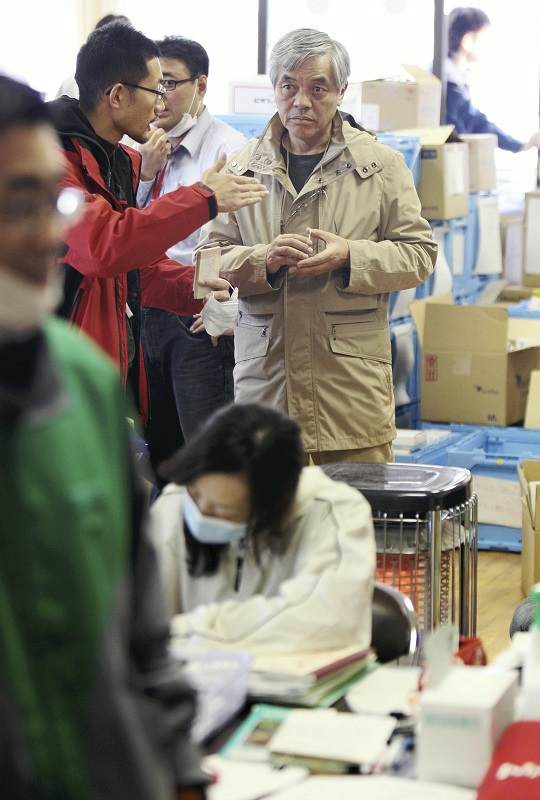
Ishiki is seen with another doctor, soon after he had identified the body of his wife in Rikuzentakata on March 31, 2011.
12:03 JST, March 15, 2021
RIKUZEN-TAKATA, Iwate — Ten years have passed since the 2011 Great East Japan Earthquake, and as the population of the affected areas continue to decline and age, the local doctors themselves are also aging.
Standing on the roof of a four-story hospital in Rikuzentakata, Iwate Prefecture, on the night of March 11, 2011, all Dr. Mikihito Ishiki could think about was local residents and the medical care they would need.
“How will I provide medical care for the people of Takata?” Ishiki, 73, thought on the day when a massive tsunami devastated the cityscape. Then director of Iwate Prefectural Takata Hospital, he evacuated to the hospital’s rooftop with about 100 patients.
A decade later, Ishiki still works as a doctor in the city and still has the same question.
After becoming director of the hospital in 2004, Ishiki set a goal of making it the most senior-friendly hospital in the nation. At that time, elderly people accounted for about 30% of the residents in Takata.
Originally a respiratory surgeon, Ishiki also treated outpatients as a physician and trained to be certified as a doctor who supports patients with dementia and their families, in an effort to meet the needs of local communities.
Just when he was beginning to feel that the hospital was becoming an ideal facility that could provide meticulous care for patients with lifestyle-related diseases and dementia, the calamity struck.
Ishiki was then 63 and had two years left before retirement. He had thought about returning to Morioka, where his family home is, or moving somewhere else where he had always wanted to live. However, the envisioned blueprint for his “second life” was torn apart when the tsunami killed his wife, Tatsuko, 57, who had always supported him.
Ishiki and his patients were rescued by helicopter the day after the disaster. Three weeks later, he was reunited with his wife at a morgue.
“Many people have lost their homes and family members. I’m a doctor. I can’t allow myself to rest until I find a way to rebuild the hospital,” he told a reporter at that time.

Mikihito Ishiki recalls the day when the tsunami struck Iwate Prefectural Takata Hospital, which has since been relocated to higher ground in Rikuzentakata, Iwate Prefecture.
Ishiki toiled to rebuild the hospital, sleeping in evacuation centers and on the second floor of a clinic in a neighboring town. About four months later, he opened a clinic in a prefabricated building.
Since retiring as director in March 2013, he has continued to look after the elderly at another clinic in the city and at public housing built for disaster victims. In one clinic located in the mountainous area, elderly people with dementia came to rely on him one after another.
“I want to provide medical care that local people can use free from anxiety,” he said.
He initially thought about remaining until he could see a light at the end of the tunnel, but the shortage of doctors in the region continues.
Just as the end of Ishiki’s term neared and he thought, “It’s time to retire,” he received another request. Local residents had come to rely on him and begged him to stay, as there was no successor. As he has continued to work, the percentage of elderly people in the Takata district reached 40%, and Ishiki himself became one of them.
“To continue to work for a long time, I have to take care of my own health and physical strength,” he said.
When Ishiki turned 70, he gave up his habit of drinking sake everyday. Instead, he started jogging five kilometers daily, and completed his first full marathon in autumn two years ago.
Next month, Ishiki will take up his fifth post-retirement job, becoming the director of a small clinic. He also plans to help out at a facility that helps prevent the elderly from becoming frail.
“I can’t leave yet,” he said. “Not as long as I’m needed here.”
Top Articles in Society
-

Man Infected with Measles Reportedly Dined at Restaurant in Tokyo Station
-

Man Infected with Measles May Have Come in Contact with Many People in Tokyo, Went to Store, Restaurant Around When Symptoms Emerged
-

Woman with Measles Visited Hospital in Tokyo Multiple Times Before Being Diagnosed with Disease
-

Australian Woman Dies After Mishap on Ski Lift in Nagano Prefecture
-

Foreign Snowboarder in Serious Condition After Hanging in Midair from Chairlift in Nagano Prefecture
JN ACCESS RANKING
-

Japan PM Takaichi’s Cabinet Resigns en Masse
-

Japan Institute to Use Domestic Commercial Optical Lattice Clock to Set Japan Standard Time
-

Israeli Ambassador to Japan Speaks about Japan’s Role in the Reconstruction of Gaza
-

Man Infected with Measles Reportedly Dined at Restaurant in Tokyo Station
-

Videos Plagiarized, Reposted with False Subtitles Claiming ‘Ryukyu Belongs to China’; Anti-China False Information Also Posted in Japan





















